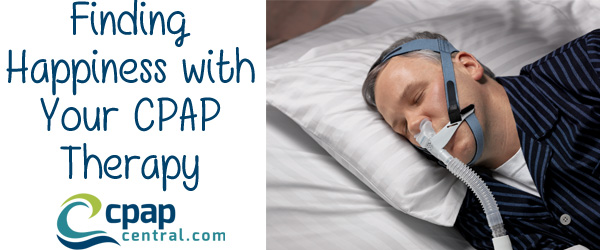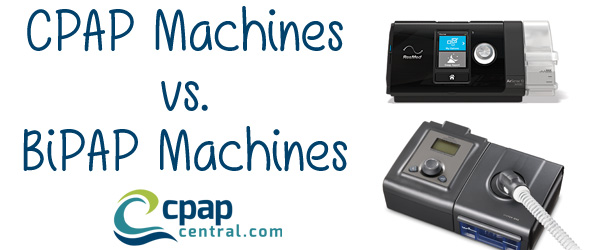
It takes some adjustment to get used to CPAP therapy, but these tips can help you find happiness with your therapy.
Whether you’re new to CPAP therapy or someone who has used it to treat sleep apnea for years, there are steps are you can take to help make your therapy as effective as possible. In observance of August as Happiness Happens Month, CPAPCentral.com wants to offer you tips to make sure you are as happy as you can be with your CPAP therapy.
Getting Used to Your CPAP Equipment
Let’s face it, it’s going to take some time for you to adjust to CPAP therapy. In a very short period of time, you will go from the way you’ve slept your whole life to sleeping with a mask on your face and air being pushed through your airway. Give yourself some time to get used to the changes. You can start by wearing your mask while you’re awake and for short periods of time during naps. As for the air pressure, many CPAP machines are fitted with ramp-up features that allow you to fall asleep at a lower pressure before increasing to your prescribed pressure once asleep.
Keep Your CPAP Equipment in Top Shape
You use your CPAP equipment every night, which means that you need to make sure you are taking care of the equipment so it can last as long as it is supposed to. The best way to do this is to develop a regular schedule for cleaning and maintaining your equipment. Some chores need to be done daily, some weekly, and others bi-monthly.
Consider Comfort Supplies
While your mask, humidifier, and CPAP machine are all you need in order to receive your therapy, you may need more than this to truly be happy with your CPAP. CPAP comfort supplies could be the solution you need. CPAP Pillows are specially designed with CPAP users in mind. Their unique shape improves mask comfort and leakage, and can make sleeping with CPAP tubing more comfortable. CPAP strap pads or liners may improve your therapy experience as well. Strap pads prevent your CPAP mask straps from leaving marks on your face and make wearing mask headgear more comfortable. Perhaps you find your CPAP comfortable, but have difficultly relaxing before falling asleep with your CPAP. An aromatherapy system may be what you need. CPAPCentral.com carries the PUR-SleepTM line of aromatherapy products which are specially designed for use with CPAP. Many users find the scents to be relaxing and enjoyable. Spend some time researching CPAP comfort supplies. Talk with your friends, physician, or our CPAP experts at CPAPCentral.com. Trying a new CPAP comfort supply could take your CPAP therapy from good to great.
Replacing CPAP Equipment
After using your equipment every night for months, pieces of your equipment will need to be replaced. This will help ensure your CPAP therapy continues to be effective and that you’re not losing out on performance due to equipment that is past its useful life. If you have a schedule for replacing your equipment, you won’t have to worry about losing sleep due to ineffective equipment.
CPAPCentral.com carries a full line of CPAP machines, CPAP masks, and other CPAP equipment. Contact us to learn more about how we can help you treat your sleep apnea and sleep better.


